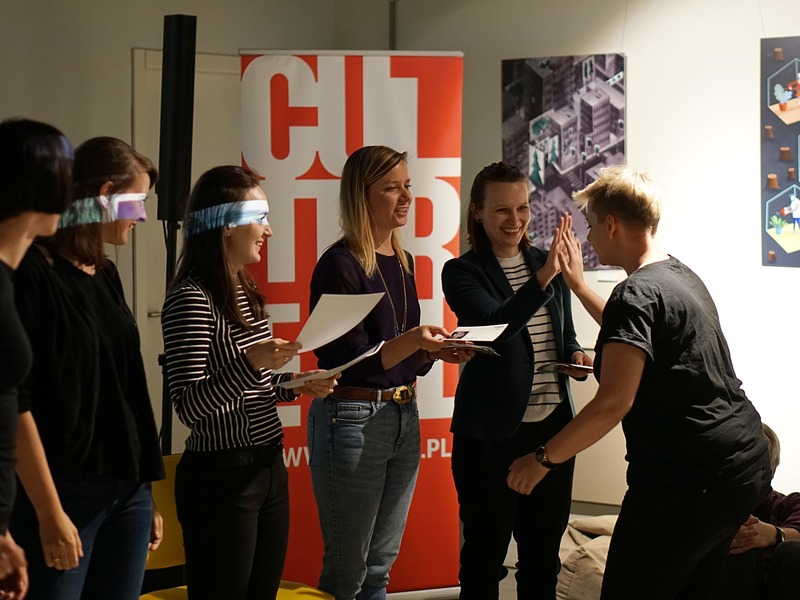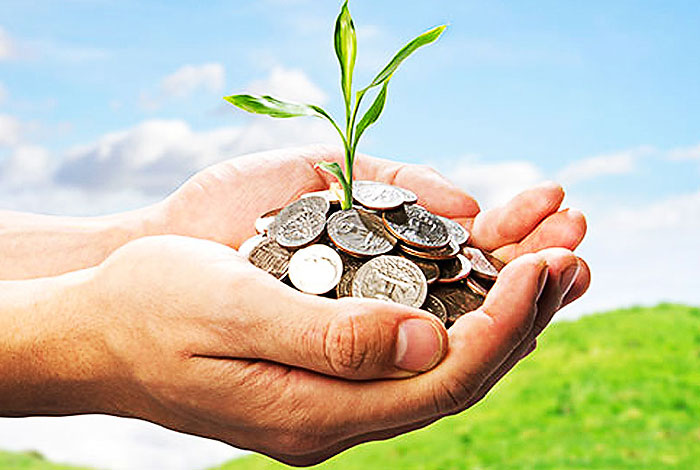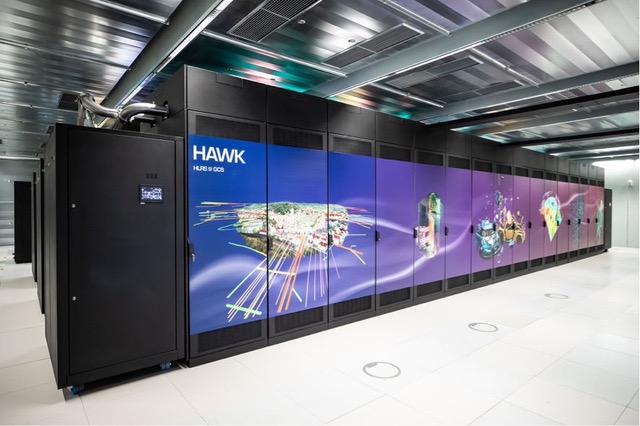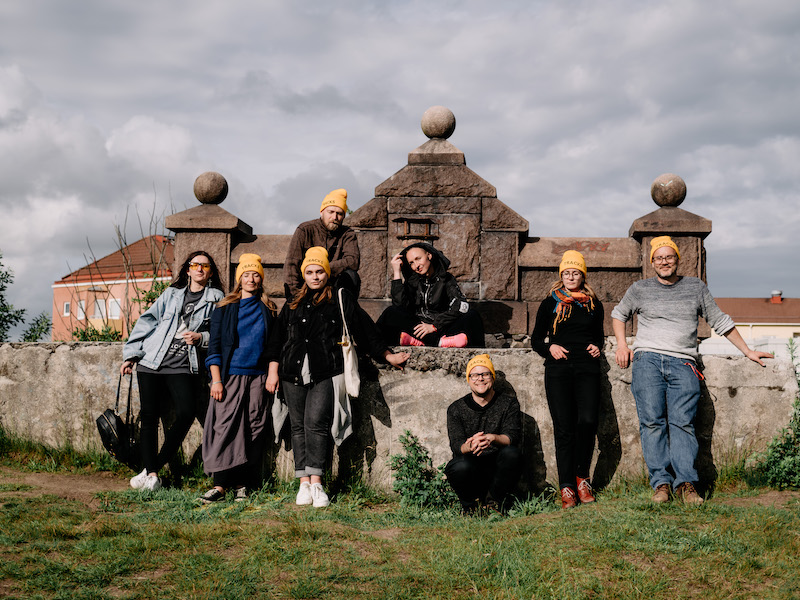
TRACKS: How art can become a tool of communication and a way of making sense of life during war?
Serhiy Zhukovsky: The Idea for TRACKS came from Sveinung Nygaard’s journey to Ukraine in the autumn of 2021 where he met artists all across Ukraine. He was deeply moved by the rise of the Ukrainian identity in the post-soviet space and felt that the core of the striving to become an independent country was in the area of the arts. This aspect of value-based art as a multitude of free but joined expressions of a country’s trajectory was something he felt was being born out of and purified in the presence of war, and that could be a starting point for discussions of identity across Europe. He felt this is now a time of storytelling and that all countries need to engage in the art of what he calls collective narration. The specific idea for a micro-festival was born after the invasion of Ukraine by Russia as a way to look beyond the immediate and focus of longer lines and the underlying issues of identity and present a platform for artists to explore this.
Challenge 1. Find partners who sincerely want to support
Sveinung Nygaard: There is a substantial amount of positive attitude towards helping Ukraine, this was key to securing partners and venues. Many in the west feel powerless and are looking for some way of helping, supporting TRACKS was one way that could contribute. Additionally, the idea of trains plays into the environmental aspect and is something the train companies are interested in. The approach of TRACKS as delicate and arts-based made it easier for the station to give us a place there as we didn’t come to dominate the space but rather to contribute to a good experience. TRACKS had good connections within the local government that also helped us position the negotiations on a higher level. All in all, the ones that were positive about contributing responded fairly quickly but due to the speed at which TRACKS was organised it did not fit with everyone's schedule and intent. 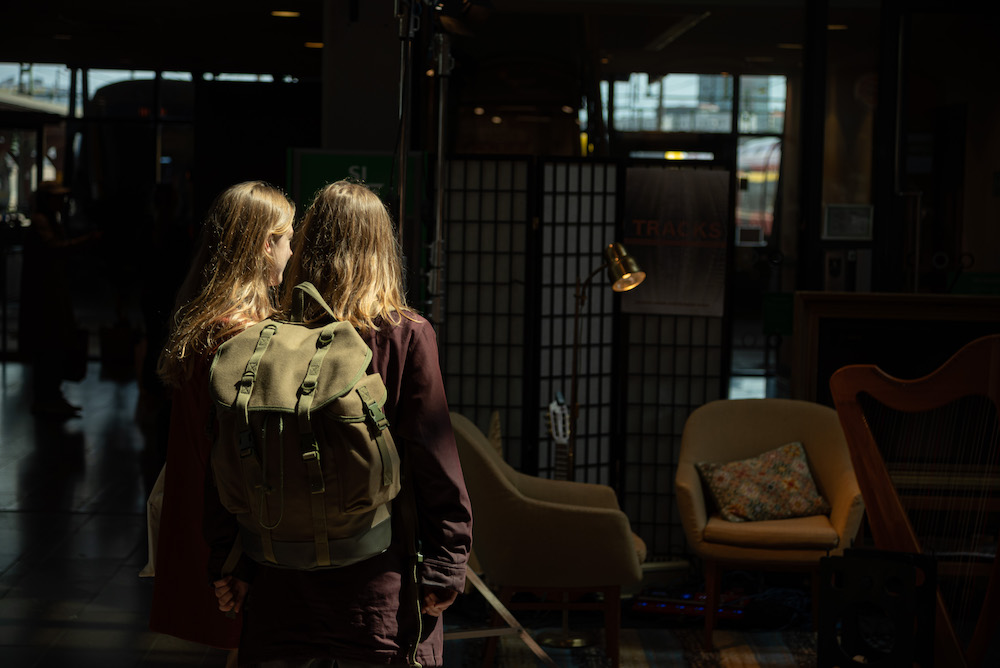
Challenge 2. Combine artists into strong pairs
S. Z.: From the very beginning, there were many artists that wanted to contribute to TRACKS and be part of it, both in Europe and in Ukraine, so the challenge was not so much in gathering the artists as in forming good pairs of artists, where personalities, skills and ambitions would match well. This is at the core of making TRACKS work. At the launch in Gothenburg, we had 12 artists organised in 6 pairs. We had 4 men and 8 women involved, out of which 3 were online due to travel restrictions in and out of Ukraine. As TRACKS has a modular structure it is flexible to how and where people contribute. For future planning, we have quite a few artists who want to participate in TRACKS.
S. N.: The general mood of the artists involved was one of delicate sensitivity and eagerness to engage both their arts partner and also the audience. There was gentleness and honesty that permeated the artworks that didn’t shy away from the harsh realities of the present but also looked to the future and thus created a platform for meetings and processing of deeper issues. There were some really magical moments of both beauty and sorrow, and new friendships were formed. The current state of war is not possible to reflect on, but we focused more on personal experiences and common threads we all carry through all times as humans.
Challenge 3. Implement everything in two weeks
S. N.: The main challenge was the short space of time we had to organise this event, both in travel arrangements but also the practicalities around the festival. A mobile micro-festival like this incorporates several venues with a certain degree of mobility and this added to the complexity of the events. Attracting an audience was also somewhat of a challenge. Finding the open and vulnerable space for artistic performances within an ambitious setup was a challenge, but the involved artists displayed a remarkable degree of flexibility that made it all come together in a very good way.

Challenge 4. Create a space for deep interaction
S. N.: The Swedish audience engaged in dialogue with the participants and there was a strong sense of collective processing that led to new insights. Some of the pairs that met through TRACKS will continue to work together outside the parameters of TRACKS. A series of videos documenting the process and the performances will be released that will convey the feeling of being a participant and audience. We felt that by using creative methods we could meet under challenging issues and create emotional connections that are not present in the normal new cycles, for instance illustrating the situation of being a refugee by one artist sitting in a cage for 4 hours. The feedback from both the Ukrainian and Swedish audiences, online and at the festival, was that we succeeded in creating a space for deep interaction that can lead to stronger links between Ukraine and Europe.
Challenge 5. Do not stop
S. N.: TRACKS is a long-term project where new understanding and meanings can occur via these TRACKS pairs that can grow into the shape they want to, with artistic freedom essential to finding purpose and connections and still staying true artists.
S. Z.: The future plans are to make more TRACKS micro-festivals across Europe and in Ukraine. For this to happen material from the launch will be released that inspires artists, organisations and organisers and that conveys the values at the core of TRACKS. We already have interest from several places and are working on laying the foundations for the next steps.
----
Feedback from artists who have become members of TRACKS:
• Denys Beregovsky aka Koin is a DJ/ Music Producer and Media artist from Ukraine, Kharkiv. Promoter and resident of local techno parties LOZH, PROSTO TEXNO, BLUE WHALE FESTIVAL. He has been a resident of the Zhivot Rave Club for 20 years and remains so to this day resident of the label Keaton. Has several releases on Manuscript and DwD record labels. He runs his newly formed label KEEP IT REAL!
"The war in Ukraine has destroyed my dreams. It divided my family because my wife stays in Israel with her parents and I stay with my mother in Berlin to take care of her – an old disabled lady in a wheelchair.
But still, I want to spread the word about the modern Ukrainian Underground and to show the artistic esthetics of modern Ukraine through the different media and my own experience being an independent artist in Ukraine.
My project for TRCKS is some kind of mixed-media installation. It is a video plus a live music performance with Lisa Nordstrom in collaboration. The meaning of my art is to create a mythological persona of Ruthenia as a metaphor for modern Ukraine but in an archaic way of expressing it. Ruthenia is the voice persona from the radio podcast. She is speaking about something from another world. Something from the depth of our souls. It is the way to speak about the war not telling about the war. For live music performances, I use recaptured audio from the war lines and from the mobile calls of Russian troops and their relatives. This is the way I can talk about the war. I wanted to take the audience on a journey through the new Mythos of Ruthenia as it isn't a methodological place or a fairy tale but something deep that existed ages before, the Matriarch Cult of old Eastern Europe".
• Amira-Gehanne Khalfallah is a journalist, novelist, playwright and filmmaker from Kasablanka, Marocco. She is the author of seven plays performed in Europe and Africa. Her short film Miss has been selected in major festivals around the world and won several prizes. Her debut novel, Le naufrage de la lune [The Wrecking of the Moon], appeared in 2018.
"Any situation of invasion and occupation in the world revolts me to the highest degree, whether in Ukraine, in the occupied territories in Palestine or elsewhere... I will always put my art, my writing at the service of those causes which I consider just. No human life should be uprooted, no land should be emptied of its people, no tree burned...
Any war, no matter how far, affects our humanity and reaches us in the most intimate way. Moreover, the war in Ukraine reminds me of the one I myself experienced in Algeria. I remember how difficult it was to make our voices heard, how not being able to travel and create affected not only my generation but also those that followed. The war cut us off from the world and above all from ourselves and led us to a withdrawal into identity.
For TRACKS I worked together with Katerina Tretiakova, a photographer from Ukraine. Katia and I come from different worlds. It is precisely in this that his work interests me and that I wish to explore it. I have nothing to say and nothing to do with those who look like me. I rather need to create alongside those who challenge my mind, push me to think differently, who takes a different look at beings and things... and it is in this sense that Katia's work allows me to move forward in my thinking and change my outlook. With Katia, we had decided to work on the body. The woman's body is the first earth. As soon as I saw the photographs in which she takes the stage, I was immediately struck by their force of attraction. Our main message of the artwork is that this collaboration can convey, it would probably be: that art can where politics fails".
• Polina Kuznetsova, painter from Kharkiv, Ukraine.
"My city is no longer safe and I no longer have a home. Now I live on a long journey, perhaps the most emotional in my life. I don’t know how ready I am at the moment to reveal all these experiences. But I feel that the theme of travel will figure in my work for a long time.
During TRACKS I made a project together with Sveinung. Last year he came to Kharkiv to meet the artists, to look at our community. I don't speak English, so we communicated with a translator's help. This is not the easiest way of communication, but I realized that Sveinung deeply feels my artworks, and understands what I paint about. Sveinung’s music is filled with magic, as are my landscapes. Even before the war, I wanted to create a joint project. It seems to me that Sveinung and I are exchanging ideas that awaken in each of us some kind of personal individual creative process. Now I travel around Ukraine and shoot short videos on the phone from trains in order to convey to Sveinung my feelings from the road. I show him the faces of people who travel from their cities somewhere into the unknown or return to dangerous zones. Thanks to Sveinung’s vision, I'm living my journey like a movie that fits well with his soundtracks.
It seems to me that we are faced with the agony of the era of the substitution of concepts. Blurring the boundaries of black and white, loss of sincerity and truth. In contrast to this, it remains to start calling a spade a spade. Do not look for white in black. This is now very strongly felt in Ukraine.
It is hard to say how the war affected me because it is still going on. I was in Kharkiv at the beginning of the war. I lived with friends and children in a bomb shelter until March 9th. My parents were in the most dangerous area of the city and survived heavy shelling. We all left Kharkiv. My cosy world was totally destroyed. It has been 100 days since I can feel safe because there is no home anywhere. The endless terrifying evil that came to my land showed a lot of good that I meet in people who are ready to help me and my loved ones in these difficult times".
• Stephanie Irvine is a harpist and singer from Glasgow, Scotland.
"I’ve always been interested in working with artists from other disciplines, but this was an opportunity to connect with an artist from not only another discipline, but a completely different reality from my own. The project feels very important as an opportunity for people to gain a new perspective on the situation in Ukraine, and to be able to process it in different ways.
For TRACKS I worked with the painter Oleksii Revika from Ukraine. I mostly know Oleksii through his work, and his paintings are really hard-hitting. I think both of us are interested in reacting to a specific feeling with our work. We are both using shape and colour, be it in images or sound. It was interesting to see what came out of the combination of this clear and often brutal visual art, and sound which is more abstract. Since Oleksii can’t leave Kyiv, we decided that he would send pictures of his paintings to Sweden and that I would perform alongside them. I used the paintings as a kind of co-musician. It was a way of communicating creatively across a great distance. I hope that the audience was able to find ways of relating to a situation that often feels too horrifying to think about. I hope it helped to create space to reflect and space for hope.
My life hasn’t been affected directly, but it has put everything in a new context. It feels strange to play music and talk about this and that, all the while having this background of unimaginable suffering happening so close to home. I wake up and read the news, then carry on with my day as normal – that’s a strange and cut-off reality to be living in".
---
FOUNDERS OF THE TRACKS PROJECT:
• Sveinung Nygaard works as the composer of music for film and tv series. He plays the guitar and also has his ambient Viking music project FLYT for which he travels to places around Europe to record music and combine them into a musical mosaic.
• Sergii Zhukovsky is a founder of different cross-cultural projects, consultant and trainer on art and culture projects management, co-founder of the International Association "Culture and Creativity".
ARTISTS TAKING PART AT THE LAUNCH IN GOTHENBURG:
• Lisa Nordström (Gothenburg) / Denis Koin (Kharkiv): Music and video, sounddesign
• Kateryna Tretiakova (Kremenchuk) / Amira Khalfallah (Casablanca): Photography and prose
• Olga Melashenko (Chernigiv) / Anders Muammar (Gothenburg): Poems and painting
• Sveinung Nygaard (Gothenburg) / Polina Kuznetsova (Kharkiv): Music and painting
• Oleksii Revika (Kyiv) / Stephanie Irvine (Scotland): Painting and harp
• Amanda Vessby (Gothenburg) / Anna Zavalskaya (Kyiv): Poem and music

